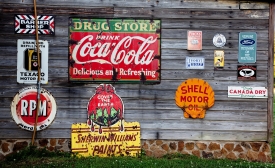middle east
Britain is to establish its first permanent military base in the Middle East since it formally withdrew from the region in 1971. The base, at the Mina Salman Port in Bahrain, will host ships including destroyers and aircraft carriers. The UK said it was an "expansion of the Royal Navy's footprint" and would "reinforce stability" in the Gulf.
The Embassy of Japan will co-host a photography exhibition titled 'Hiroshima, City of Peace' in association with the city of Hiroshima, Oman-Japan Friendship Association (OJFA), and the Hiroshima-Oman Friendship Association, from November 30 to December 6, in the main atrium of Muscat Grand Mall.
In our international surveys at the Pew Research Center, we explore how people in countries around the world differ on a wide range of political, economic, and social topics. But very few issues generate the kind of differences we see when we ask about homosexuality.
The fall of the Berlin Wall 25 years ago this month signaled the unmatched strength of U.S. economic and military power, but it also reflected the seductive charisma of American democracy and its open, pluralistic, prosperous society — or so Americans thought at the time.
The nation now most prone to such diplomatic pirouettes is the United States, still the world’s greatest power. Its strength has ever been defined, in important part, as idealism, “soft” power: belief in pluralism in politics, in free speech and a free press. These institutions are held to self-evidently good for a society: and the United States, with the European allies, has long preferred and rewarded those states which promise to follow that path.
According to counterinsurgency strategist David Galula, the clearest way to take support away from an insurgent is to hold successful elections. Elections are the most visible way a population demonstrates their choice for the government rather than the insurgent.

An edited transcript of the October 2, CPD-BBC Forum: "Does Soft Power Really Matter?" held at the University of Southern California







